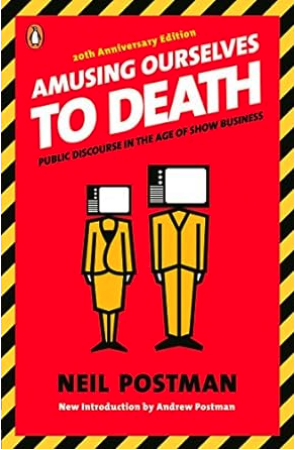I was introduced to the book, Amusing Ourselves To Death by Neil Postman and it has me scratching my head in a good way.
In particluare the Forward is incredibly powerful which you can read here if you don’t have the book. Despite the book being written decades ago about the issues of television(yes, remember when that caused the same feelings we have now with AI), I keep thinking about AI and what does AI “think” about the words and how would AI convey the content?
I created this AI generated video using the forward from Neil Postman book Amusing Ourselves To Death using ChatGPT 4 + AI.INVIDEO
I had AI make video renditions using the voice over text. This is one of them. I have made several which I should post them all, but one is good for now.
Go ahead and watch it and then consider the questions below.
As the book was about television I think it readily applies to AI today. I made a table comparing concepts of the book to Social Media and AI today as well.
Curious what others think?
1. Balancing Visions and Realities: How do the dystopian visions of Orwell and Huxley reflect in the integration of AI in education today, and in what ways might AI align more closely with one perspective over the other?
2. Navigating Autonomy and Information Overload: How can AI foster student autonomy and maturity without sacrificing critical thinking and problem-solving skills, and in the context of Huxley’s concerns about information overload, how should educators leverage AI to enhance rather than hinder engagement and learning?
3. Cultural and Ethical Implications: What impact does the increasing use of AI-driven tools in education have on culture and ethical considerations? Are we moving towards Huxley’s ‘trivial culture,’ or are these technologies enriching educational experiences? How do ethical considerations of AI use reflect the concerns raised by Orwell and Huxley?
4. Shaping the Future of Education with AI: In the face of predictions made by Huxley and Orwell, what strategic measures can educators take to ensure AI serves as a catalyst for positive transformation in education rather than leading towards dystopian outcomes?

Leave a Reply